Golden Retrievers are beloved family companions known for their gentle nature, intelligence, and stunning golden coats. However, maintaining their health and vitality requires understanding the best diet for dogs, particularly the unique nutritional needs of this magnificent breed. Whether you’re a new Golden Retriever parent or looking to optimize your dog’s nutrition, this comprehensive guide will help you navigate the world of diet canine science and discover the best canine diet for your furry friend.
Contents
- 1 Understanding Golden Retriever Nutritional Requirements
- 2 Life Stage Nutrition: Tailoring the Best Diet for Dogs
- 3 Commercial vs. Homemade: Choosing the Best Diet for Dogs
- 4 Understanding Raw Diets: A Controversial Approach
- 5 Special Dietary Considerations for Golden Retrievers
- 6 Feeding Schedule and Portion Control
- 7 Supplements and Treats in the Best Diet for Dogs
- 8 Transitioning to a New Diet
- 9 Red Flags: Foods to Avoid
- 10 Working with Veterinary Professionals
- 10.1 When to Consult a Veterinarian
- 10.2 Veterinary Nutritionist Consultation
- 10.3 What is the best diet for Golden Retriever puppies?
- 10.4 How much should I feed my adult Golden Retriever?
- 10.5 Are grain-free diets the best diet for dogs?
- 10.6 Can Golden Retrievers eat raw food?
- 10.7 How do I know if my Golden Retriever’s diet is working?
- 10.8 What supplements should I add to my Golden Retriever’s diet?
- 11 Final Thoughts
Understanding Golden Retriever Nutritional Requirements
Golden Retrievers have specific dietary needs that differ from other breeds due to their size, activity level, and genetic predispositions. The best diet for dogs of this breed must account for their tendency toward weight gain, joint issues, and their active lifestyle requirements.
Essential Macronutrients for Golden Retrievers
A proper diet canine plan for Golden Retrievers should include balanced proportions of proteins, fats, and carbohydrates. Protein should comprise 18-25% of their diet, with high-quality animal proteins taking priority. Fats should make up 8-15% of their daily intake, providing essential fatty acids for coat health and energy. Carbohydrates, while not essential, can provide valuable energy and fiber when sourced from whole grains and vegetables.
The best canine diet incorporates lean meats like chicken, turkey, fish, and lamb as primary protein sources. These proteins support muscle development and maintenance, which is crucial for Golden Retrievers’ active lifestyle and their tendency to develop hip dysplasia and other joint issues.
Life Stage Nutrition: Tailoring the Best Diet for Dogs
Puppy Nutrition (8 weeks to 12-18 months)
Golden Retriever puppies require a diet canine specialists recommend for large breed puppies. The best diet for dogs during this crucial growth period should contain 22-24% protein and 12-14% fat. However, it’s essential to avoid overfeeding, as rapid growth can contribute to developmental orthopedic diseases.
During the puppy stage, feed high-quality large breed puppy formula 3-4 times daily until 6 months of age, then transition to twice daily feeding. The best canine diet for puppies includes controlled calcium and phosphorus levels to support proper bone development.
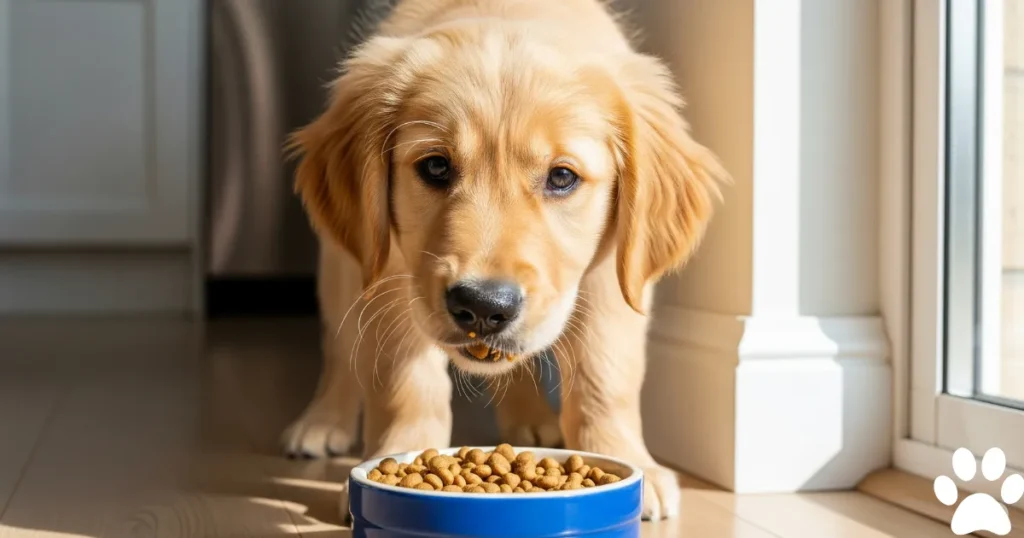
Adult Nutrition (1-7 years)
Adult Golden Retrievers thrive on a diet canine nutritionists design specifically for active, medium to large breeds. The best diet for dogs at this stage should maintain 18-25% protein and 8-12% fat. This balanced approach supports their energy needs while preventing excessive weight gain.
The best canine diet for adult Golden Retrievers should include omega-3 fatty acids from fish oil or flaxseed to support coat health and joint function. Glucosamine and chondroitin supplements can also benefit joint health, considering the breed’s predisposition to hip and elbow dysplasia.

Senior Nutrition (7+ years)
Senior Golden Retrievers benefit from a modified diet canine approach that addresses age-related changes. The best diet for dogs in their golden years should be easily digestible with moderate protein levels (18-20%) and reduced calories to accommodate decreased activity levels.
The best canine diet for senior Golden Retrievers should include antioxidants like vitamin E and C to support cognitive function and immune health. Joint support ingredients become even more critical during this stage.
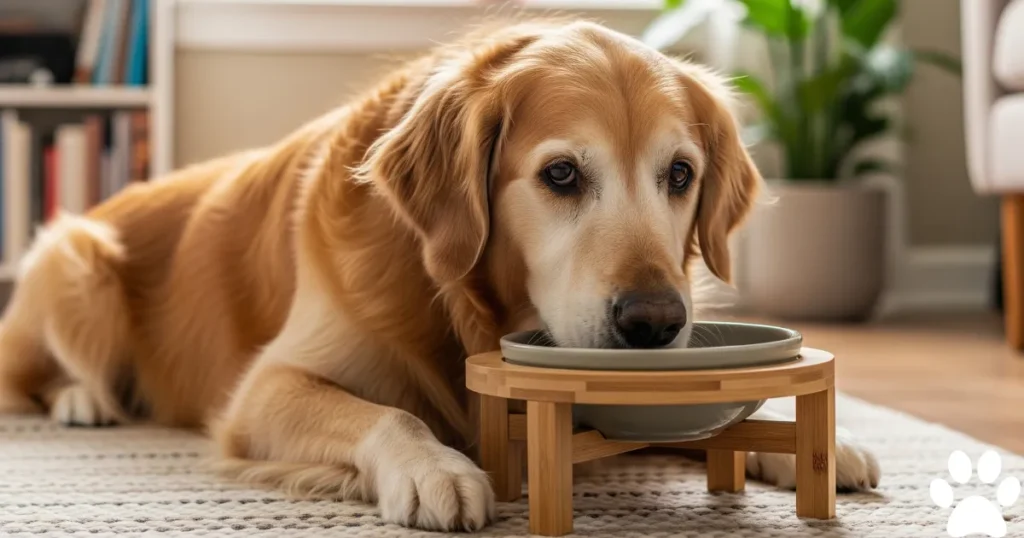
Commercial vs. Homemade: Choosing the Best Diet for Dogs
Premium Commercial Foods
High-quality commercial dog foods offer convenience and balanced nutrition when selecting the best diet for dogs. Look for foods that meet AAFCO (Association of American Feed Control Officials) standards and list specific meat sources as the first ingredient.
When evaluating commercial options for your diet canine needs, avoid foods with excessive fillers, by-products, or artificial preservatives. The best canine diet options will include named meat meals, whole grains, and recognizable vegetables.
Popular premium brands for Golden Retrievers often include ingredients like deboned chicken, sweet potatoes, and blueberries, providing the balanced nutrition essential for the best diet for dogs.
Homemade Diet Considerations
Some owners prefer preparing homemade meals as the best diet for dogs, but this requires careful planning to ensure nutritional completeness. A proper diet canine veterinarian or pet nutritionist should be a homemade diets to prevent deficiencies.
The best canine diet when prepared at home should include protein sources (40-50%), vegetables (30-40%), and carbohydrates (10-20%). Essential supplements like calcium, vitamins, and omega fatty acids may be necessary to create a truly balanced homemade diet.
Understanding Raw Diets: A Controversial Approach
The debate surrounding raw food diets continues in the diet canine community. While some advocate for the healthiest food for dogs being raw, others express concerns about bacterial contamination and nutritional imbalances.
If considering a raw diet as the best diet for dogs, consult with a veterinary nutritionist to ensure proper balance and safety protocols. The best canine diet should prioritize safety and complete nutrition over dietary trends.
Special Dietary Considerations for Golden Retrievers
Weight Management
Golden Retrievers are prone to obesity, making weight management crucial in determining the best diet for dogs of this breed. The diet canine approach should emphasize portion control and high-quality ingredients over quantity.
Signs of healthy weight include feeling ribs easily with light pressure and observing a visible waist when viewed from above. The best canine diet for weight management includes high-fiber ingredients and controlled calorie density.
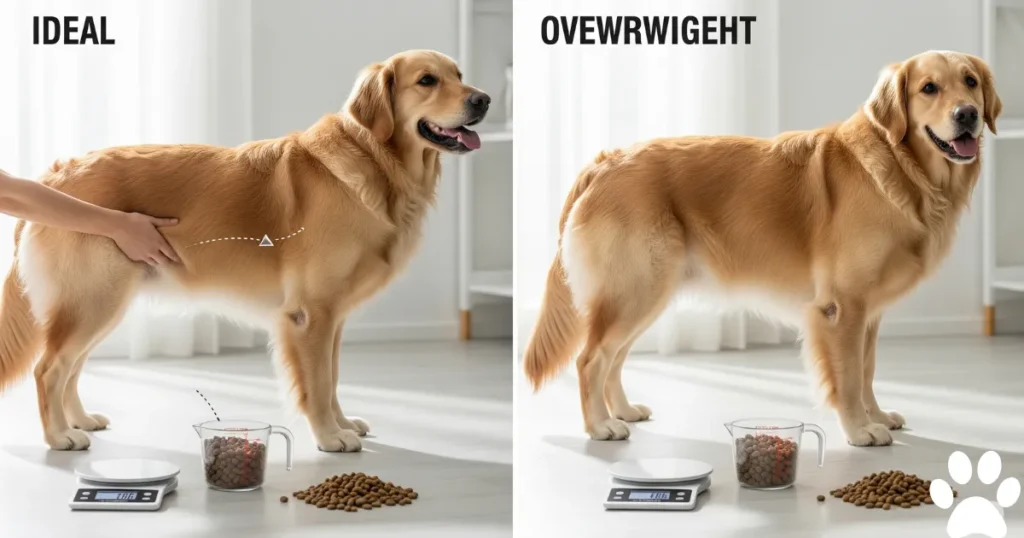
Food Allergies and Sensitivities
Some Golden Retrievers develop food allergies or sensitivities, requiring modified diet canine approaches. Common allergens include chicken, beef, dairy, wheat, and corn. The best diet for dogs with allergies often features novel protein sources like duck, venison, or fish.
Elimination diets help identify problematic ingredients, leading to the best canine diet for sensitive Golden Retrievers. Hypoallergenic commercial foods or carefully planned homemade diets can provide relief from food-related symptoms.
Joint Health Support
Given Golden Retrievers’ predisposition to hip dysplasia and elbow dysplasia, the best diet for dogs of this breed should include joint-supporting nutrients. Glucosamine, chondroitin, and omega-3 fatty acids contribute to cartilage health and inflammation reduction.
The diet canine approach for joint health should also maintain optimal weight to reduce stress on joints. The best canine diet balances nutrition with calorie control to support long-term mobility.
Feeding Schedule and Portion Control
Establishing Feeding Routines
The best diet for dogs includes consistent feeding schedules that support digestive health and behavioral stability. Adult Golden Retrievers typically thrive on twice-daily feeding, while puppies and seniors may benefit from more frequent, smaller meals.
A proper diet canine schedule helps prevent bloat (gastric dilatation-volvulus), a serious condition that can affect deep-chested breeds like Golden Retrievers. The best canine diet routine includes waiting at least one hour after meals before vigorous exercise.
Portion Size Guidelines
Determining proper portions is essential for the best diet for dogs. Golden Retriever puppies typically need 1-3 cups daily (divided into multiple meals), while adults require 2-4 cups daily depending on age, weight, and activity level.
The diet canine portions should be adjusted based on body condition scoring rather than strict guidelines. The best canine diet maintains ideal body weight through careful monitoring and portion adjustments.
Supplements and Treats in the Best Diet for Dogs
Essential Supplements
While a high-quality commercial diet often provides complete nutrition, certain supplements can enhance the best diet for dogs. Omega-3 fatty acids, probiotics, and joint support supplements commonly benefit Golden Retrievers.
The diet canine supplementation should complement, not replace, a balanced diet. Consult with veterinarians before adding supplements to ensure they align with the best canine diet for your dog’s specific needs.
Healthy Treat Options
Treats should comprise no more than 10% of daily calories in the best diet for dogs. The perfect diet for dogs includes treats that provide nutritional value rather than empty calories.
Excellent treat options for Golden Retrievers include small pieces of cooked chicken, carrots, green beans, and apple slices (without seeds). These best people food for dogs options support training while maintaining nutritional balance within the diet canine framework.
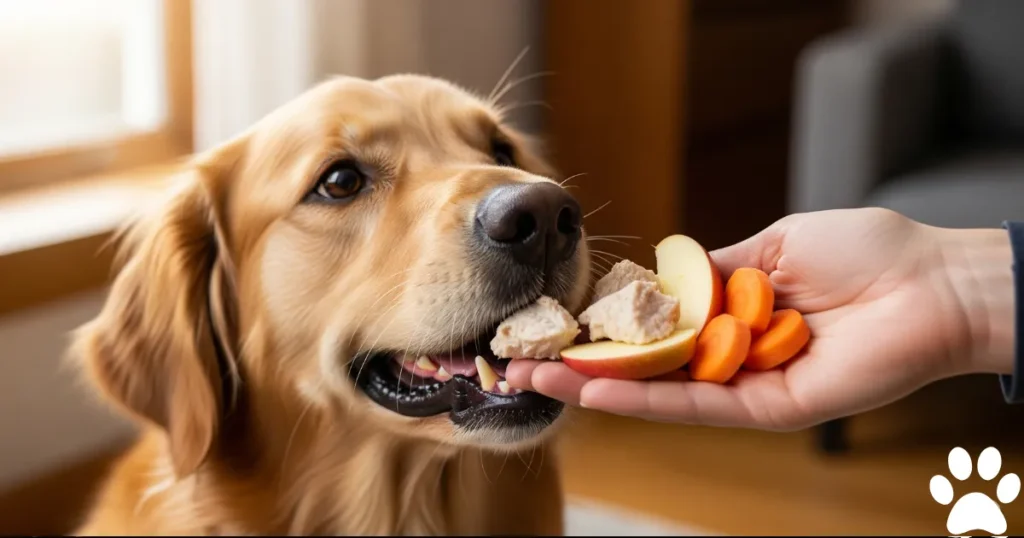
Transitioning to a New Diet
Gradual Transition Process
When changing to a new best diet for dogs, a gradual transition prevents digestive upset. The diet canine transition should occur over 7-10 days, gradually increasing the new food while decreasing the old food.
Day 1-2: 25% new food, 75% old food Day 3-4: 50% new food, 50% old food Day 5-6: 75% new food, 25% old food Day 7+: 100% new food
This methodical approach ensures the best canine diet transition without causing gastrointestinal distress.
Monitoring During Transition
Watch for signs of digestive upset during diet changes, including loose stools, vomiting, or decreased appetite. The best diet for dogs transition should be smooth, and any concerning symptoms warrant veterinary consultation.
The diet canine change process requires patience and observation to ensure the new food agrees with your Golden Retriever’s digestive system. The best canine diet should improve energy, coat condition, and overall health.
Red Flags: Foods to Avoid
Toxic Foods for Dogs
Certain foods are dangerous for dogs and should never be included in the best diet for dogs. Chocolate, grapes, raisins, onions, garlic, and xylitol-containing products can cause severe health issues or death.
Understanding which foods to avoid is crucial for diet canine safety. The best canine diet excludes all potentially harmful ingredients and focuses on dog-safe, nutritious options.
Signs of Dietary Problems
Watch for symptoms indicating the current diet isn’t the best diet for dogs for your Golden Retriever. These include chronic diarrhea, excessive gas, dull coat, lethargy, or frequent ear infections.
Changes in appetite, weight gain or loss, and behavioral changes can also indicate diet canine issues. The best canine diet should promote vibrant health and energy in Golden Retrievers.
Working with Veterinary Professionals
When to Consult a Veterinarian
Regular veterinary checkups help ensure your chosen best diet for dogs meets your Golden Retriever’s needs. Schedule consultations when changing diets, if health issues arise, or for routine wellness evaluations.
Veterinarians can assess whether your current diet canine approach supports optimal health and recommend adjustments if needed. Professional guidance ensures the best canine diet for your dog’s circumstances.
Veterinary Nutritionist Consultation
For complex dietary needs or health conditions, veterinary nutritionists provide specialized expertise in creating the best diet for dogs. They can formulate custom diets or recommend specific commercial foods.
This professional diet canine guidance becomes especially valuable for Golden Retrievers with allergies, chronic health conditions, or specific dietary requirements that require the best canine diet customization.
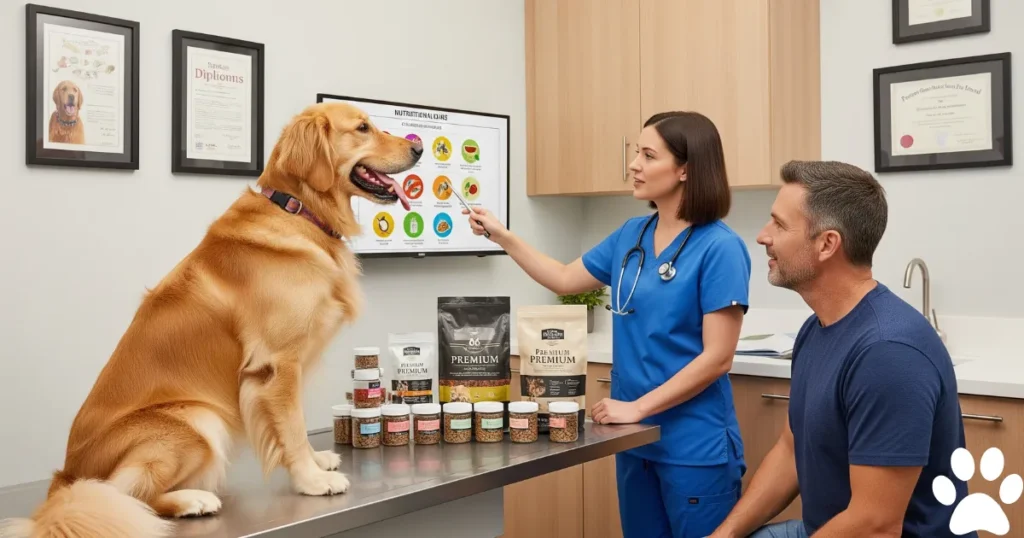
What is the best diet for Golden Retriever puppies?
The best diet for dogs during puppyhood includes large breed puppy formula with 22-24% protein and 12-14% fat. This diet canine approach supports healthy growth without promoting too rapid development that could lead to joint problems.
How much should I feed my adult Golden Retriever?
Adult Golden Retrievers typically need 2-4 cups of high-quality food daily, divided into two meals. The best canine diet portions depend on age, weight, activity level, and metabolism. Monitor body condition and adjust portions accordingly.
Are grain-free diets the best diet for dogs?
Grain-free diets aren’t necessarily the best diet for dogs unless your Golden Retriever has specific grain allergies. Recent research suggests potential links between grain-free diets and heart disease in dogs, making traditional diet canine formulations often safer choices.
Can Golden Retrievers eat raw food?
While some advocate for raw diets as the best canine diet, they require careful planning and carry risks of bacterial contamination. Consult with veterinary professionals before transitioning to raw feeding to ensure it’s the best diet for dogs for your specific Golden Retriever.
How do I know if my Golden Retriever’s diet is working?
Signs of an effective diet canine approach include healthy weight maintenance, shiny coat, good energy levels, normal bowel movements, and overall vitality. The best diet for dogs should promote all aspects of health and well-being.
What supplements should I add to my Golden Retriever’s diet?
Common beneficial supplements for the best canine diet include omega-3 fatty acids for coat and joint health, glucosamine for joint support, and probiotics for digestive health. Always consult with veterinarians before adding supplements to ensure they complement your chosen best diet for dogs.
Final Thoughts
Creating the best diet for dogs, specifically Golden Retrievers, requires understanding their unique nutritional needs, life stage requirements, and individual health considerations. The ideal diet canine approach balances high-quality proteins, healthy fats, and appropriate carbohydrates while avoiding harmful ingredients.
Remember that the best canine diet is one that promotes optimal health, maintains ideal body weight, and supports your Golden Retriever’s active lifestyle. Whether you choose premium commercial foods, carefully planned homemade meals, or work with veterinary nutritionists to create custom diets, the key is consistency, quality, and attention to your dog’s individual needs.
Regular veterinary checkups, careful observation of your dog’s health and energy levels, and willingness to adjust the diet as needs change will ensure your Golden Retriever enjoys the best diet for dogs throughout their life. With proper nutrition, your Golden Retriever can maintain optimal health, a beautiful coat, and the energy to be your devoted companion for years to come.
Dr. Nabeel A.
Hi, I’m Dr. Nabeel Akram – a farm management professional by trade and a passionate Golden Retriever enthusiast at heart. With years of experience in animal science and livestock care, I’ve built a career around understanding animals—how they live, thrive, and bring value to our lives. This blog is a personal project born from that same passion, focusing on one of the most loyal and lovable breeds out there: the Golden Retriever. Whether I’m managing farm operations or sharing insights on canine health, behavior, and care, it all ties back to one core belief—animals deserve thoughtful, informed, and compassionate attention. Welcome to a space where professional expertise meets genuine love for dogs.
Facebook |
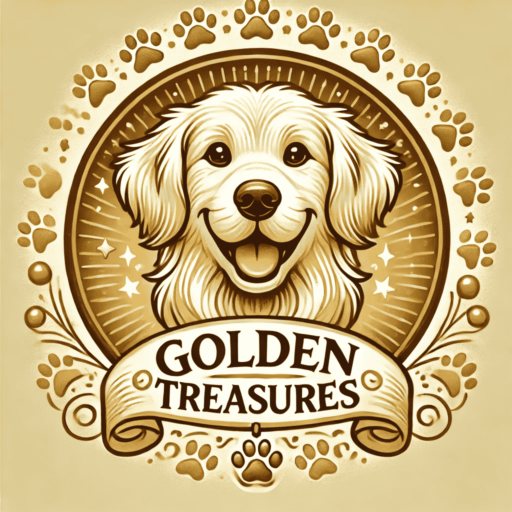
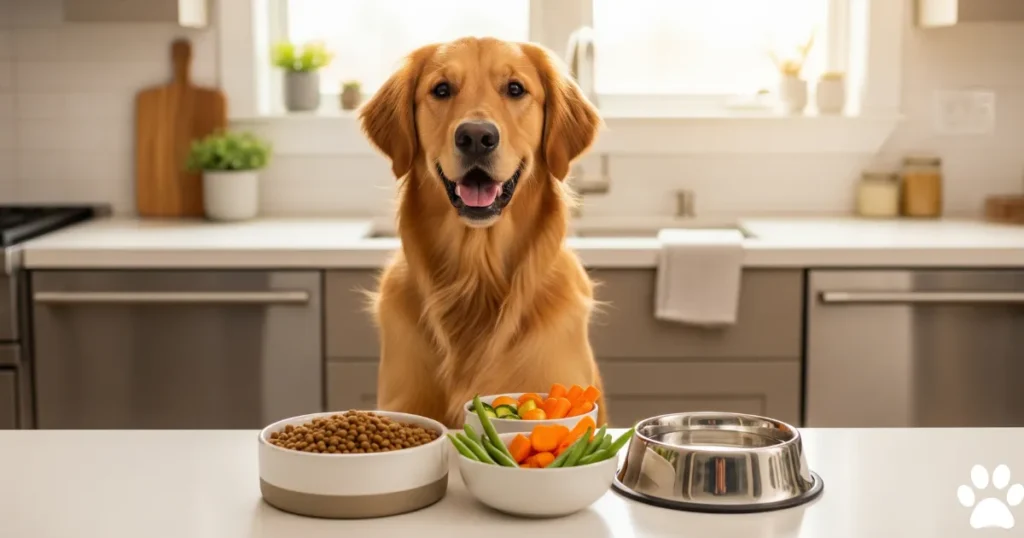
Links will be automatically removed from comments.